Economics 1: Analysis of Investment, Trade, and Macroeconomic Policies
VerifiedAdded on 2022/11/01
|5
|1026
|442
Homework Assignment
AI Summary
This Economics 1 assignment explores three key areas: the role of intuition in investment decisions, the benefits and drawbacks of free trade agreements, and the impact of macroeconomic policy on business success. The assignment argues that intuition, alongside traditional accounting methods, is crucial for quick decision-making, especially in uncertain situations. It then examines free trade agreements, concluding that the benefits, such as increased economic growth and access to cheaper resources, outweigh the disadvantages. Finally, the assignment emphasizes the vital role of macroeconomic policies in fostering a stable economy, influencing factors of production, and helping businesses navigate inflation, deflation, and exchange rate fluctuations. The paper provides a detailed analysis supported by relevant literature.
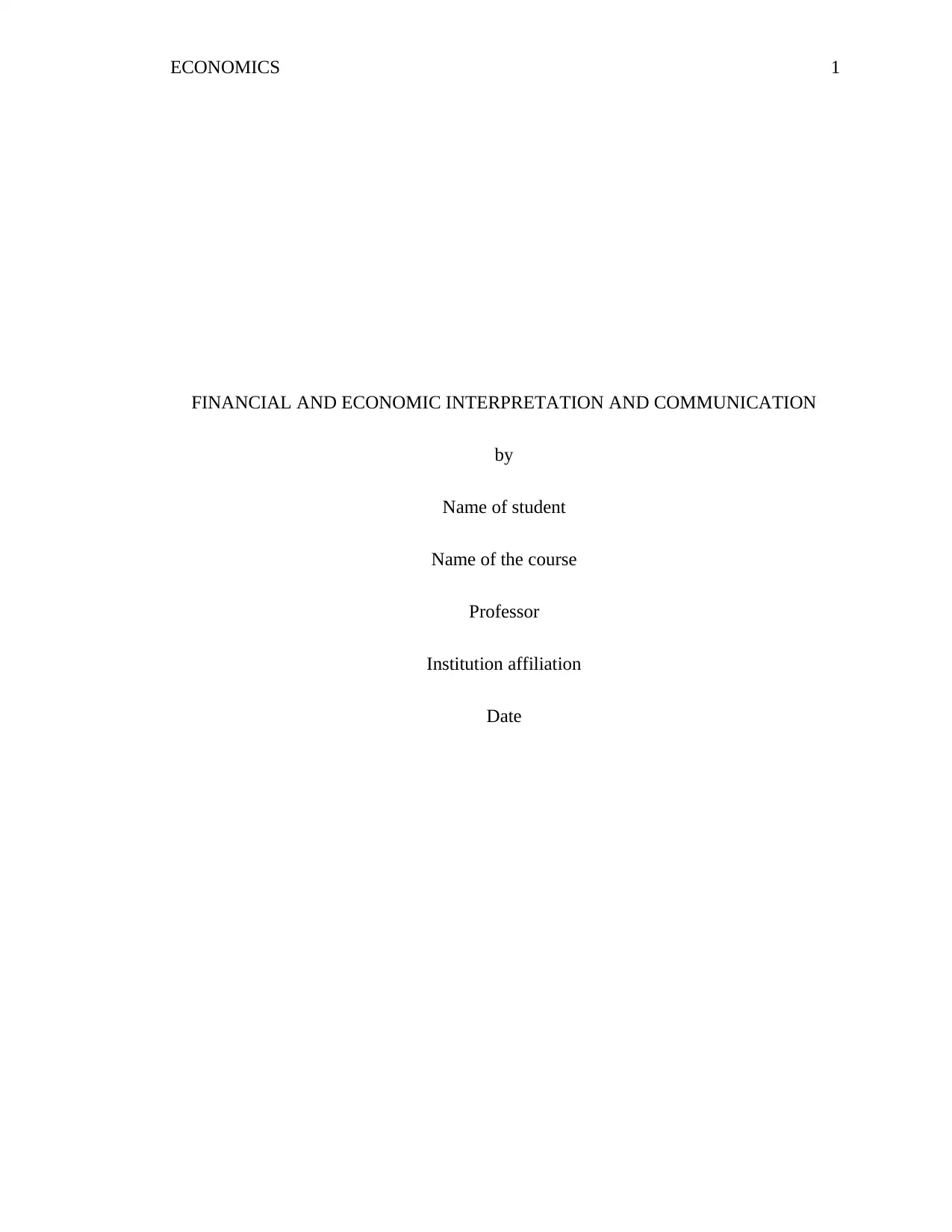
ECONOMICS 1
FINANCIAL AND ECONOMIC INTERPRETATION AND COMMUNICATION
by
Name of student
Name of the course
Professor
Institution affiliation
Date
FINANCIAL AND ECONOMIC INTERPRETATION AND COMMUNICATION
by
Name of student
Name of the course
Professor
Institution affiliation
Date
Paraphrase This Document
Need a fresh take? Get an instant paraphrase of this document with our AI Paraphraser
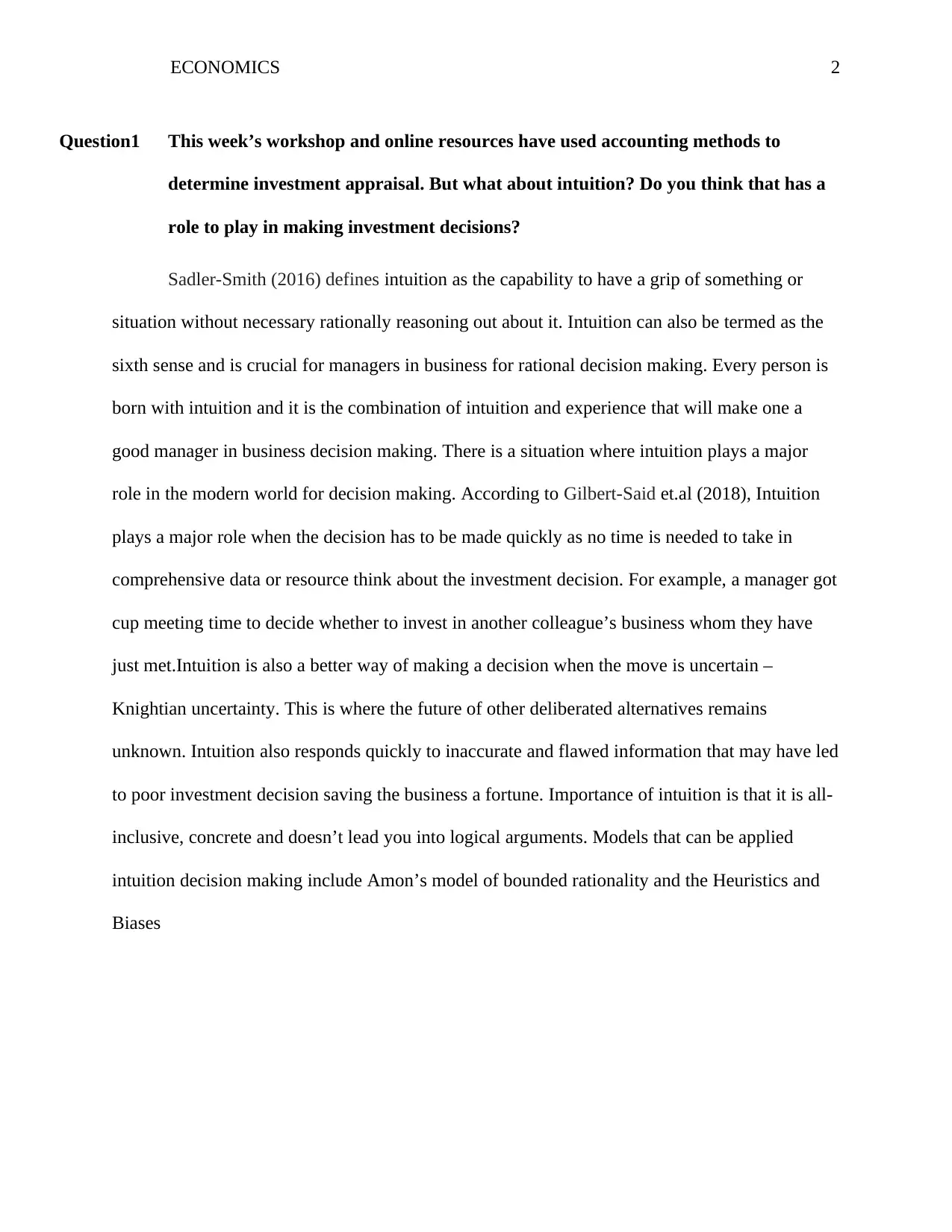
ECONOMICS 2
Question1 This week’s workshop and online resources have used accounting methods to
determine investment appraisal. But what about intuition? Do you think that has a
role to play in making investment decisions?
Sadler-Smith (2016) defines intuition as the capability to have a grip of something or
situation without necessary rationally reasoning out about it. Intuition can also be termed as the
sixth sense and is crucial for managers in business for rational decision making. Every person is
born with intuition and it is the combination of intuition and experience that will make one a
good manager in business decision making. There is a situation where intuition plays a major
role in the modern world for decision making. According to Gilbert-Said et.al (2018), Intuition
plays a major role when the decision has to be made quickly as no time is needed to take in
comprehensive data or resource think about the investment decision. For example, a manager got
cup meeting time to decide whether to invest in another colleague’s business whom they have
just met.Intuition is also a better way of making a decision when the move is uncertain –
Knightian uncertainty. This is where the future of other deliberated alternatives remains
unknown. Intuition also responds quickly to inaccurate and flawed information that may have led
to poor investment decision saving the business a fortune. Importance of intuition is that it is all-
inclusive, concrete and doesn’t lead you into logical arguments. Models that can be applied
intuition decision making include Amon’s model of bounded rationality and the Heuristics and
Biases
Question1 This week’s workshop and online resources have used accounting methods to
determine investment appraisal. But what about intuition? Do you think that has a
role to play in making investment decisions?
Sadler-Smith (2016) defines intuition as the capability to have a grip of something or
situation without necessary rationally reasoning out about it. Intuition can also be termed as the
sixth sense and is crucial for managers in business for rational decision making. Every person is
born with intuition and it is the combination of intuition and experience that will make one a
good manager in business decision making. There is a situation where intuition plays a major
role in the modern world for decision making. According to Gilbert-Said et.al (2018), Intuition
plays a major role when the decision has to be made quickly as no time is needed to take in
comprehensive data or resource think about the investment decision. For example, a manager got
cup meeting time to decide whether to invest in another colleague’s business whom they have
just met.Intuition is also a better way of making a decision when the move is uncertain –
Knightian uncertainty. This is where the future of other deliberated alternatives remains
unknown. Intuition also responds quickly to inaccurate and flawed information that may have led
to poor investment decision saving the business a fortune. Importance of intuition is that it is all-
inclusive, concrete and doesn’t lead you into logical arguments. Models that can be applied
intuition decision making include Amon’s model of bounded rationality and the Heuristics and
Biases
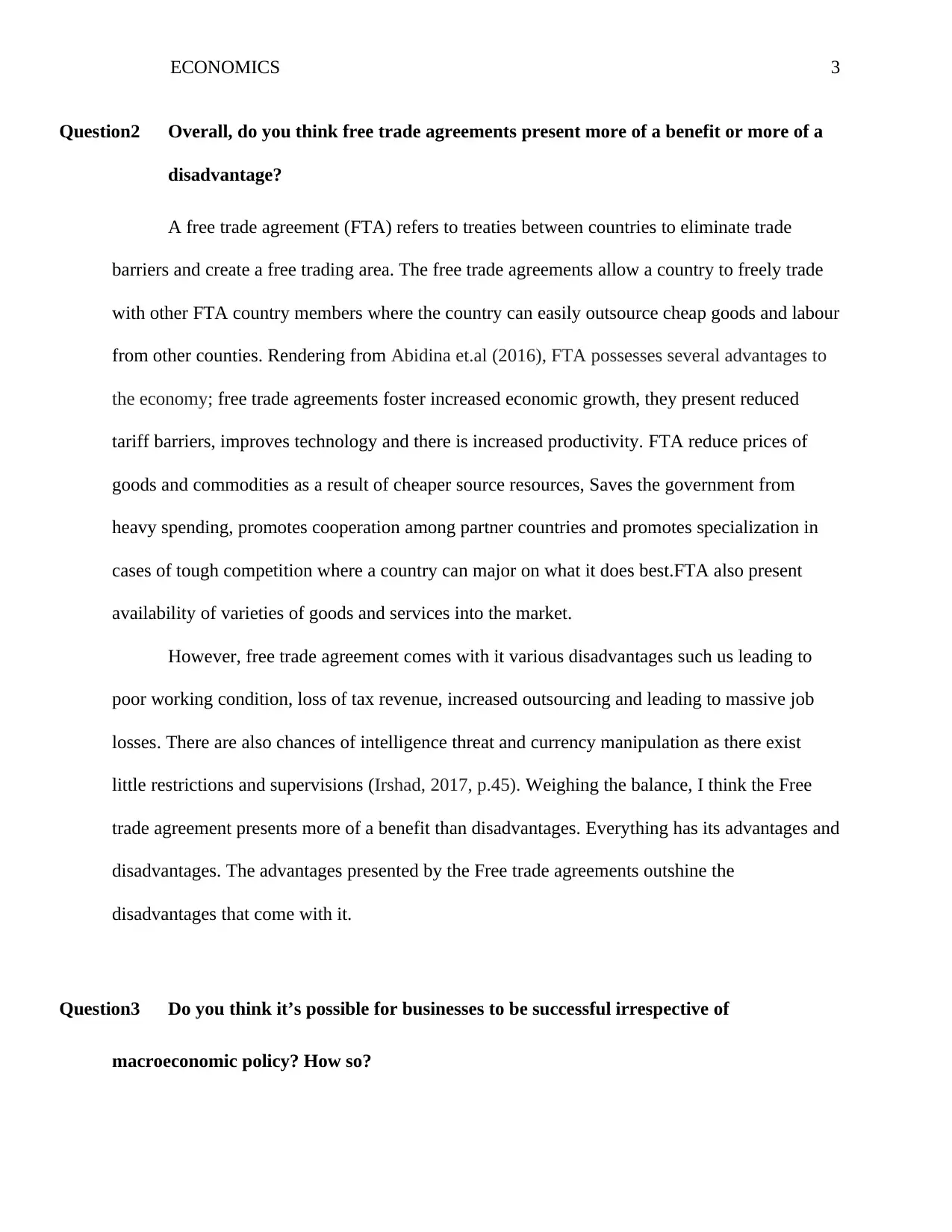
ECONOMICS 3
Question2 Overall, do you think free trade agreements present more of a benefit or more of a
disadvantage?
A free trade agreement (FTA) refers to treaties between countries to eliminate trade
barriers and create a free trading area. The free trade agreements allow a country to freely trade
with other FTA country members where the country can easily outsource cheap goods and labour
from other counties. Rendering from Abidina et.al (2016), FTA possesses several advantages to
the economy; free trade agreements foster increased economic growth, they present reduced
tariff barriers, improves technology and there is increased productivity. FTA reduce prices of
goods and commodities as a result of cheaper source resources, Saves the government from
heavy spending, promotes cooperation among partner countries and promotes specialization in
cases of tough competition where a country can major on what it does best.FTA also present
availability of varieties of goods and services into the market.
However, free trade agreement comes with it various disadvantages such us leading to
poor working condition, loss of tax revenue, increased outsourcing and leading to massive job
losses. There are also chances of intelligence threat and currency manipulation as there exist
little restrictions and supervisions (Irshad, 2017, p.45). Weighing the balance, I think the Free
trade agreement presents more of a benefit than disadvantages. Everything has its advantages and
disadvantages. The advantages presented by the Free trade agreements outshine the
disadvantages that come with it.
Question3 Do you think it’s possible for businesses to be successful irrespective of
macroeconomic policy? How so?
Question2 Overall, do you think free trade agreements present more of a benefit or more of a
disadvantage?
A free trade agreement (FTA) refers to treaties between countries to eliminate trade
barriers and create a free trading area. The free trade agreements allow a country to freely trade
with other FTA country members where the country can easily outsource cheap goods and labour
from other counties. Rendering from Abidina et.al (2016), FTA possesses several advantages to
the economy; free trade agreements foster increased economic growth, they present reduced
tariff barriers, improves technology and there is increased productivity. FTA reduce prices of
goods and commodities as a result of cheaper source resources, Saves the government from
heavy spending, promotes cooperation among partner countries and promotes specialization in
cases of tough competition where a country can major on what it does best.FTA also present
availability of varieties of goods and services into the market.
However, free trade agreement comes with it various disadvantages such us leading to
poor working condition, loss of tax revenue, increased outsourcing and leading to massive job
losses. There are also chances of intelligence threat and currency manipulation as there exist
little restrictions and supervisions (Irshad, 2017, p.45). Weighing the balance, I think the Free
trade agreement presents more of a benefit than disadvantages. Everything has its advantages and
disadvantages. The advantages presented by the Free trade agreements outshine the
disadvantages that come with it.
Question3 Do you think it’s possible for businesses to be successful irrespective of
macroeconomic policy? How so?
⊘ This is a preview!⊘
Do you want full access?
Subscribe today to unlock all pages.

Trusted by 1+ million students worldwide
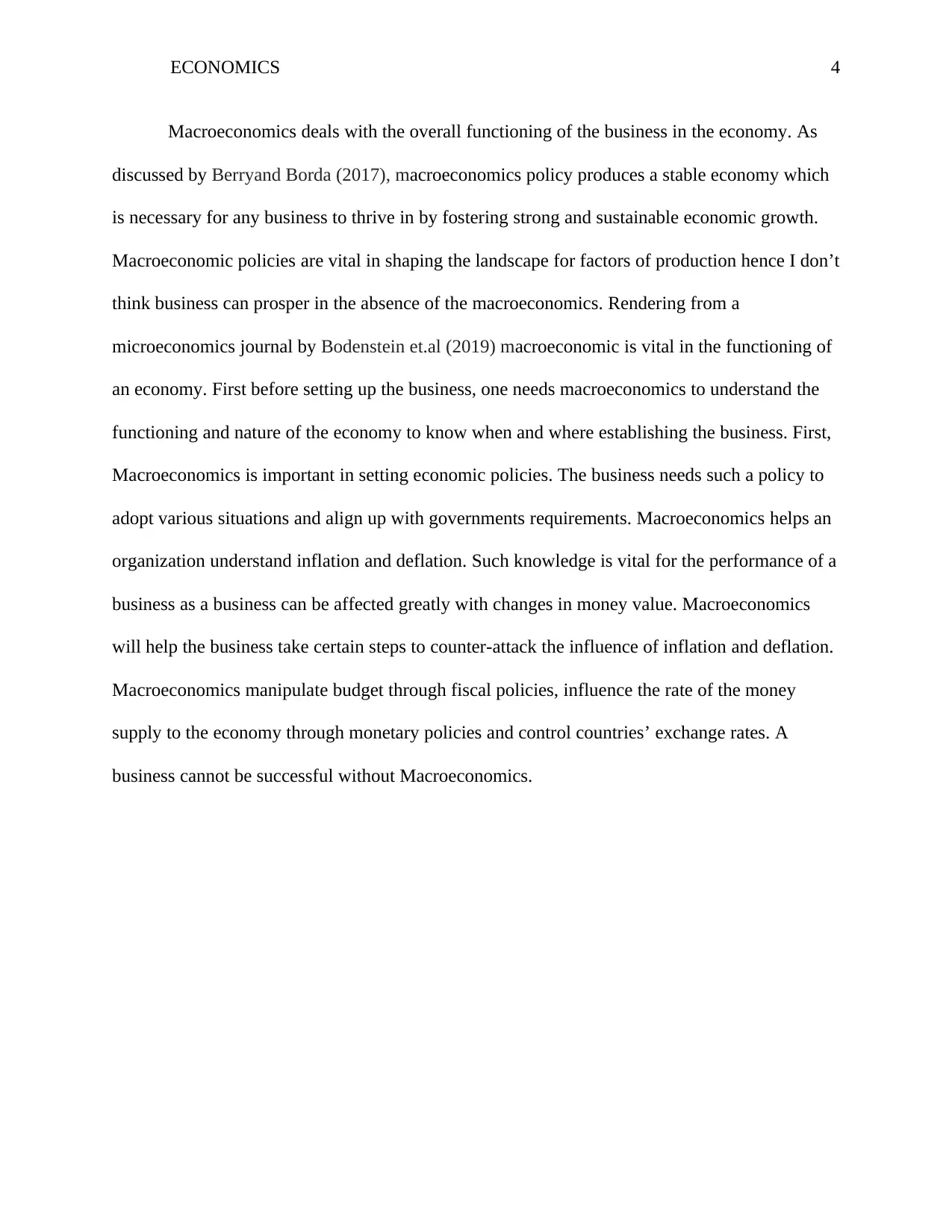
ECONOMICS 4
Macroeconomics deals with the overall functioning of the business in the economy. As
discussed by Berryand Borda (2017), macroeconomics policy produces a stable economy which
is necessary for any business to thrive in by fostering strong and sustainable economic growth.
Macroeconomic policies are vital in shaping the landscape for factors of production hence I don’t
think business can prosper in the absence of the macroeconomics. Rendering from a
microeconomics journal by Bodenstein et.al (2019) macroeconomic is vital in the functioning of
an economy. First before setting up the business, one needs macroeconomics to understand the
functioning and nature of the economy to know when and where establishing the business. First,
Macroeconomics is important in setting economic policies. The business needs such a policy to
adopt various situations and align up with governments requirements. Macroeconomics helps an
organization understand inflation and deflation. Such knowledge is vital for the performance of a
business as a business can be affected greatly with changes in money value. Macroeconomics
will help the business take certain steps to counter-attack the influence of inflation and deflation.
Macroeconomics manipulate budget through fiscal policies, influence the rate of the money
supply to the economy through monetary policies and control countries’ exchange rates. A
business cannot be successful without Macroeconomics.
Macroeconomics deals with the overall functioning of the business in the economy. As
discussed by Berryand Borda (2017), macroeconomics policy produces a stable economy which
is necessary for any business to thrive in by fostering strong and sustainable economic growth.
Macroeconomic policies are vital in shaping the landscape for factors of production hence I don’t
think business can prosper in the absence of the macroeconomics. Rendering from a
microeconomics journal by Bodenstein et.al (2019) macroeconomic is vital in the functioning of
an economy. First before setting up the business, one needs macroeconomics to understand the
functioning and nature of the economy to know when and where establishing the business. First,
Macroeconomics is important in setting economic policies. The business needs such a policy to
adopt various situations and align up with governments requirements. Macroeconomics helps an
organization understand inflation and deflation. Such knowledge is vital for the performance of a
business as a business can be affected greatly with changes in money value. Macroeconomics
will help the business take certain steps to counter-attack the influence of inflation and deflation.
Macroeconomics manipulate budget through fiscal policies, influence the rate of the money
supply to the economy through monetary policies and control countries’ exchange rates. A
business cannot be successful without Macroeconomics.
Paraphrase This Document
Need a fresh take? Get an instant paraphrase of this document with our AI Paraphraser
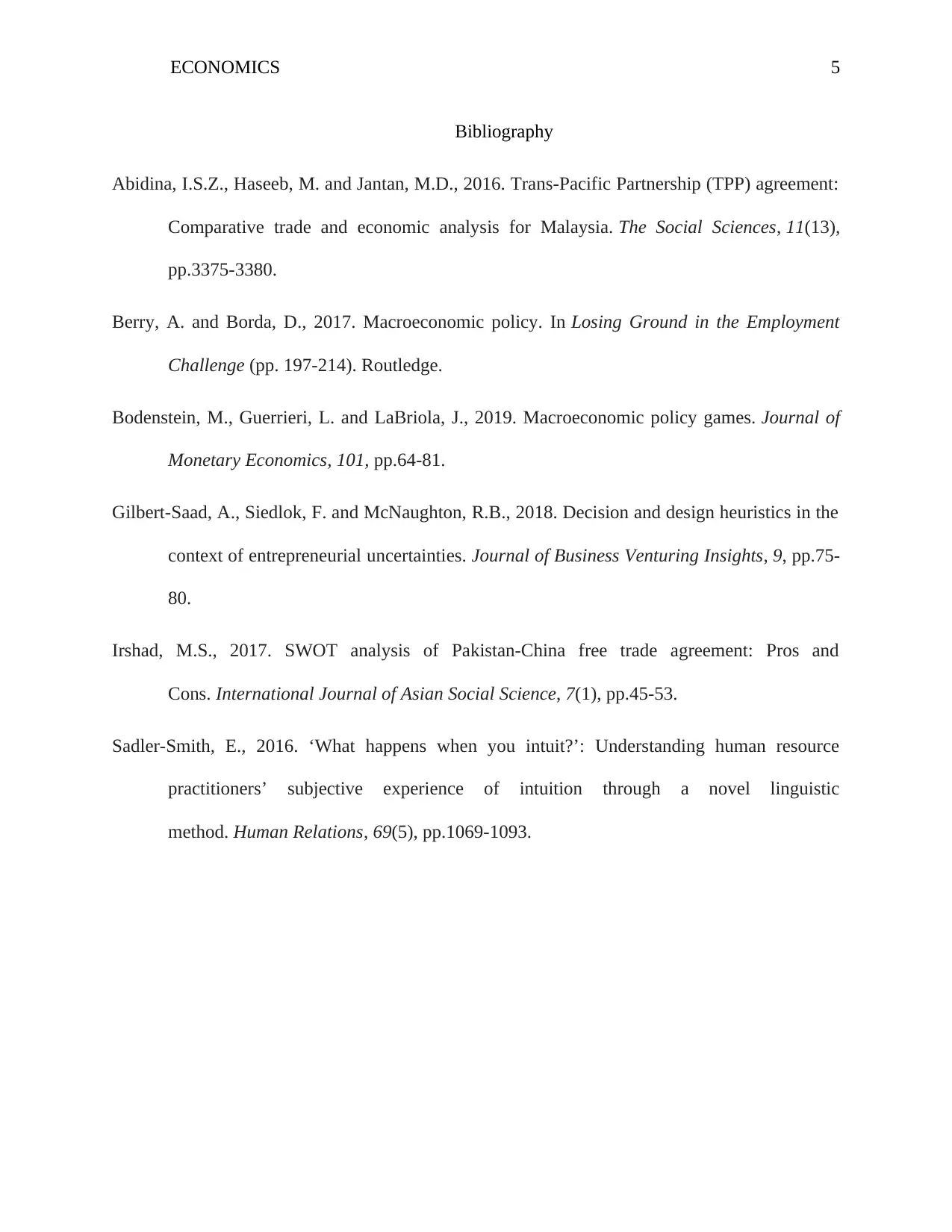
ECONOMICS 5
Bibliography
Abidina, I.S.Z., Haseeb, M. and Jantan, M.D., 2016. Trans-Pacific Partnership (TPP) agreement:
Comparative trade and economic analysis for Malaysia. The Social Sciences, 11(13),
pp.3375-3380.
Berry, A. and Borda, D., 2017. Macroeconomic policy. In Losing Ground in the Employment
Challenge (pp. 197-214). Routledge.
Bodenstein, M., Guerrieri, L. and LaBriola, J., 2019. Macroeconomic policy games. Journal of
Monetary Economics, 101, pp.64-81.
Gilbert-Saad, A., Siedlok, F. and McNaughton, R.B., 2018. Decision and design heuristics in the
context of entrepreneurial uncertainties. Journal of Business Venturing Insights, 9, pp.75-
80.
Irshad, M.S., 2017. SWOT analysis of Pakistan-China free trade agreement: Pros and
Cons. International Journal of Asian Social Science, 7(1), pp.45-53.
Sadler-Smith, E., 2016. ‘What happens when you intuit?’: Understanding human resource
practitioners’ subjective experience of intuition through a novel linguistic
method. Human Relations, 69(5), pp.1069-1093.
Bibliography
Abidina, I.S.Z., Haseeb, M. and Jantan, M.D., 2016. Trans-Pacific Partnership (TPP) agreement:
Comparative trade and economic analysis for Malaysia. The Social Sciences, 11(13),
pp.3375-3380.
Berry, A. and Borda, D., 2017. Macroeconomic policy. In Losing Ground in the Employment
Challenge (pp. 197-214). Routledge.
Bodenstein, M., Guerrieri, L. and LaBriola, J., 2019. Macroeconomic policy games. Journal of
Monetary Economics, 101, pp.64-81.
Gilbert-Saad, A., Siedlok, F. and McNaughton, R.B., 2018. Decision and design heuristics in the
context of entrepreneurial uncertainties. Journal of Business Venturing Insights, 9, pp.75-
80.
Irshad, M.S., 2017. SWOT analysis of Pakistan-China free trade agreement: Pros and
Cons. International Journal of Asian Social Science, 7(1), pp.45-53.
Sadler-Smith, E., 2016. ‘What happens when you intuit?’: Understanding human resource
practitioners’ subjective experience of intuition through a novel linguistic
method. Human Relations, 69(5), pp.1069-1093.
1 out of 5
Related Documents
Your All-in-One AI-Powered Toolkit for Academic Success.
+13062052269
info@desklib.com
Available 24*7 on WhatsApp / Email
![[object Object]](/_next/static/media/star-bottom.7253800d.svg)
Unlock your academic potential
Copyright © 2020–2026 A2Z Services. All Rights Reserved. Developed and managed by ZUCOL.




